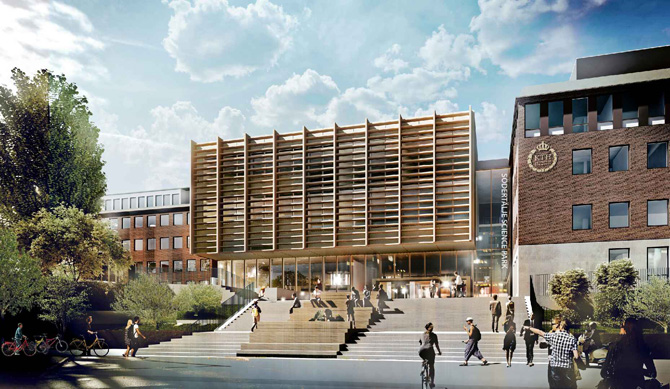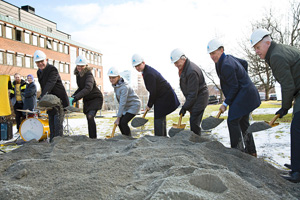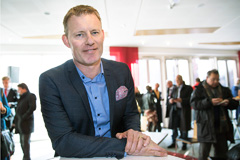
KTH grows in Södertälje
KTH Royal Institute of Technology took a symbolic step into the future last week, with the official groundbreaking ceremony at the site of its new campus in the Greater Stockholm city of Södertälje. The university is investing heavily in sustainable production and is a key partner in the Södertälje Science Park now under construction.
"This is the new Swedish model, which will strengthen Sweden and the Swedish manufacturing industry in the global competition," said Mikael Damberg, the Swedish government's Economic Development and Innovation Minister.
Representatives of all parties in the venture were present for a solemn, yet simple dedication on February 23, with about 300 people witnessing the first shovels to dig in.

In addition to a new campus, the venture consists of four new courses, which were chiseled out in cooperation with Scania and AstraZeneca – two world-leading companies in industrial production.
"Through a strong commitment we have created unique programs that complement KTH's existing offering, and which will generate very attractive engineers," said Jan Wikander, Director of Education for the School of Industrial Engineering and Management, within which the operations in Södertälje will be included.
KTH is also in the process of building up a whole new research organization in Södertälje, where new groups will work with strategic maintenance, production logistics and production management — specifically in sustainable industry.
"At its core, the research will take an industrial perspective to combining environmental conservation and social sustainability, which also characterizes the new MSc program that starts in the autumn," said Kristina Palm, Head of KTH operations in Södertälje.
Sodertalje Science Park is intended as a meeting place for academia, industry and the local community, and a melting pot of new ideas and innovations.

"This educational environment means fantastic opportunities, not least in the meetings and collaborations that can be created between small and large businesses, researchers and students," said Eva Malmström Jonsson, Vice Dean at KTH.
The purely physical proximity of the two major industrial companies' everyday operations opens up endless opportunities for collaborations and exchanges, from guest lecturers and on-site laboratories to industrial doctorates and joint projects.
"The key is well-educated staff," says Lars-Henrik Jörnving, Vice President, Global Industrial Development at Scania. "Through such cooperation, together we can enhance national capacities and strengthen Sweden's competitiveness. By strengthening the academic base in Södertälje, where Scania now employs 14,000 people, the entire region becomes even more attractive."

Jörnving pointed out that Scania has a long history of collaboration with KTH as its first strategic partner, which of course facilitated the work and discussions regarding how the courses in Södertälje should look. But Scania and AstraZeneca have been working together for many years, too, according to Peter Alvarsson, Head of Operational Excellence & Lean, AstraZeneca Sweden Operations.
"This investment means that together we will develop in order to face the future. I would love to have studied the logistics and management of sustainable production at KTH Södertälje. It seems really fun," Alvarsson said, noting that he studied chemical engineering at KTH at one time.
The 13,000-square-kilometer Södertälje Science Park will be completed in autumn 2017.
Jill Klackenberg